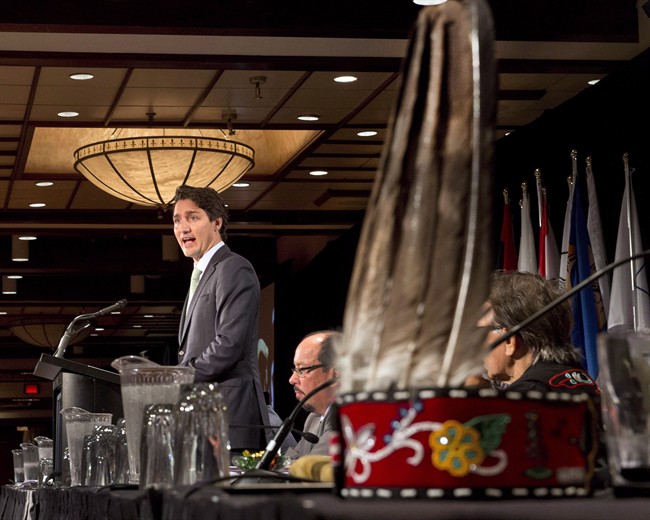WINNIPEG — Some First Nations leaders say the federal election awoke a sleeping giant that the incoming Liberal government will have to contend with — starting with an inquiry into missing and murdered aboriginal women.

Voter turnout spiked by up to 20 per cent in some largely aboriginal ridings. Chiefs said Tuesday the higher turnout helped drive the Conservatives from office after almost a decade and bring about the prospect of a new, respectful relationship with Ottawa.
A jubilant Grand Chief Derek Nepinak with the Assembly of Manitoba Chiefs called it “a great day.”
“I feel a lot of relief from the years of very purposeful oppression that was brought forward from the previous government,” Nepinak said.
“Mr. Harper, when he was prime minister, awoke a sleeping giant in our people. That giant is awake and the new Liberal majority government is going to have to deal with a giant in the indigenous people of these lands.”
In the riding of Churchill-Keewatinook Aski, which covers much of Manitoba’s north, chiefs said turnout was up by more than 11,000 voters — an increase of 20 per cent from 2011. Some polling stations on reserves worried the high turnout would lead to their running out of ballots, which prompted last-minute calls to Elections Canada.
RELATED: Reports of ballot shortages in Churchill riding unfounded
Elections Canada said Tuesday it hadn’t calculated aboriginal voter turnout yet.
Expectations of a new Liberal government are high. Chiefs have a list of issues they want addressed. At the top is an inquiry into Canada’s estimated 1,200 missing and murdered aboriginal women.
Grand Chief Sheila North Wilson, who represents northern First Nations in Manitoba, said people are looking for an inquiry to be called within the first 100 days of Justin Trudeau’s mandate. The families of those who have lost loved ones must be the driving force, she said.
“There are many things that we’re hearing from our own families of why they see these problems,” said North Wilson, who is with Manitoba Keewatinowi Okimakanak. “A lot of it has to do with poverty, lack of education and even just the complete disregard for our people.”
Kevin Hart, Manitoba regional chief with the Assembly of First Nations, said his people woke up with a sense of relief and look forward to working with Ottawa. Housing, clean water, equal education funding and resource-sharing for First Nations communities are all top priorities, he said.
“Change was needed. Fear-mongering, hate literature and hate campaigns against ethnic groups across Canada failed. True Canadians came out and showed support,” Hart said.
Hopes are high among northern Ontario aboriginals as well.
Chief Erwin Redsky of the Shoal Lake 40 First Nation on the Manitoba-Ontario boundary said turnout was up in 40 First Nations within the riding of Kenora. Redsky said it was at least 90 per cent on his reserve, which has been under a boil-water advisory for 17 years and has been fighting for a rudimentary all-weather road.
Greg Rickford, who was natural resources minister, lost his seat to former Liberal Indian Affairs Minister Bob Nault in a tough three-way race. People were engaged this time around, Redsky said, especially when they heard promises of a new nation-to-nation relationship with Canada.
“I asked my wife to pinch me,” Redsky said. “I thought I’d never hear that … We look forward to this new era. The work has just begun.”



Comments